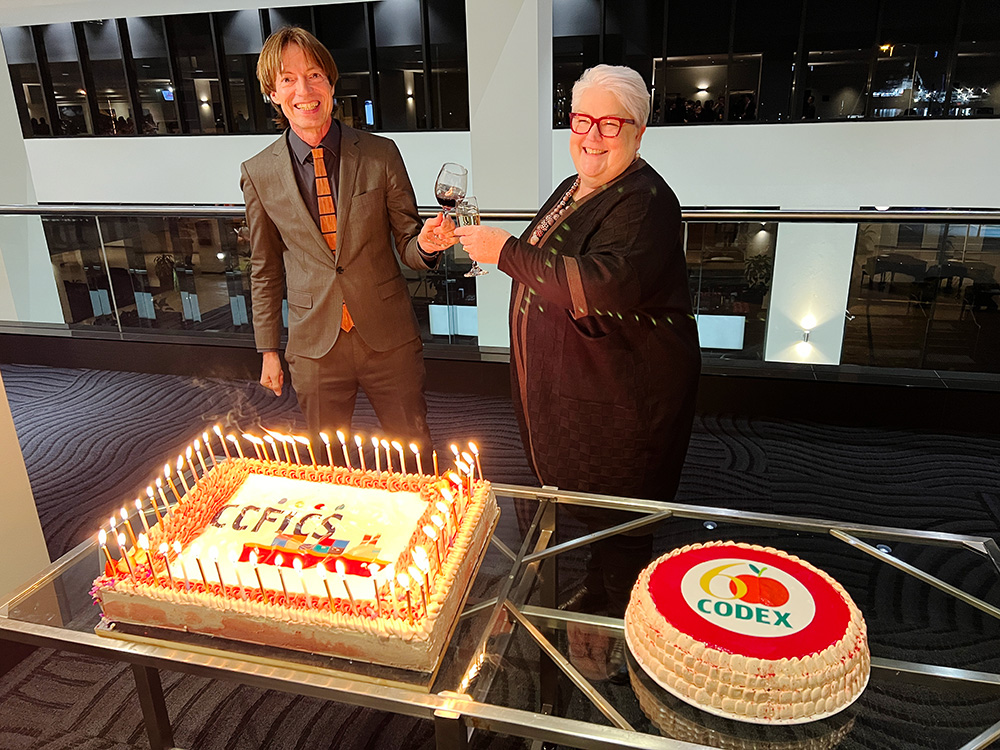CCFICS / Key role in transition to sustainable agriculture says Minister
Murray Watt, Australian Minister for Agriculture, Fisheries and Forestry and Minister for Emergency Management, speaking via video message, welcomed delegates gathering in Hobart, Tasmania, and online, for the opening of the Codex Committee on Food Import and Export Inspection and Certification Systems (CCFICS) taking place from 1-5 May 2023.
Watt said that achieving sustainable productivity growth in agriculture was increasingly critical to meet global food security concerns arising from the world's growing population. It was also vital to deliver on international commitments to limit climate change, reduce the impact of agricultural production on the environment, and to contribute to the Sustainable Development Goals under the UN 2030 Agenda.
“Free and open global trade will be essential to accelerate the transition to best practice sustainable agricultural production while meeting increased global demand for food and nutrition,” he said, with CCFICS playing a key role in this transition to protect the health of consumers and facilitate the economically and socially vital international trade in safe food.
The FAO work programme is intimately connected to Codex Alimentarius, explained Catherine Bessy. “CCFICS texts are the backbone of our work as we help countries to unpack, adopt and adapt Codex guidelines to their national situations,” she said.
Akio Hasegawa, WHO, said that for 60 years science had played a critical role in the success of Codex. “The decisions made by the Codex Alimentarius have an important impact on public health in the topics discussed at this session,” he said.

Codex Secretary Tom Heilandt with CCFICS Chairperson Nicola Hinder celebrating the 60th Anniversary of the Codex Alimentarius Commission, Hobart, Australia
Speaking via video message, Diego Varela, Chile, Vice-Chairperson of the Codex Alimentarius Commission, said CCFICS continued to make a strong contribution to the work and mandate of the Codex Alimentarius and to “our commitment to the advancement of consensus driven and science-based standards in the interest of people everywhere that we seek to protect.”
“Trade needs trust,” said Codex Secretary Tom Heilandt. CCFICS carries out essential work because it deals with the structures needed to apply Codex standards. “Without these structures functioning well, a standard may convert itself into a barrier to trade,” he said. Heilandt also acknowledged Australia as the first committee host to organize a fully hybrid meeting.
Learn more
©Photo Credit FAO/Codex
At the heart of the Codex mandate are the core values of collaboration, inclusiveness, consensus building and transparency. Governmental and non-governmental, public and private organizations alike play a vital role in ensuring Codex texts are of the highest quality and based on sound science.
Codex would have little authority in the field of international standard setting if it did not welcome and acknowledge the valuable contributions made by observers. Expert technical bodies, industry and consumer associations
contribute to the standard-setting process in a spirit of openness, collaboration and transparency.
Intergovernmental organizations (IGOs) and international non-governmental organizations (NGOs) can apply for observer status in Codex in order to attend and put forward their views at every stage of the standard-setting process.
 Current Codex Alimentarius Commission
Current Codex Alimentarius Commission
CCFICS / Key role in transition to sustainable agriculture says Minister
Murray Watt, Australian Minister for Agriculture, Fisheries and Forestry and Minister for Emergency Management, speaking via video message, welcomed delegates gathering in Hobart, Tasmania, and online, for the opening of the Codex Committee on Food Import and Export Inspection and Certification Systems (CCFICS) taking place from 1-5 May 2023.
Watt said that achieving sustainable productivity growth in agriculture was increasingly critical to meet global food security concerns arising from the world's growing population. It was also vital to deliver on international commitments to limit climate change, reduce the impact of agricultural production on the environment, and to contribute to the Sustainable Development Goals under the UN 2030 Agenda.
“Free and open global trade will be essential to accelerate the transition to best practice sustainable agricultural production while meeting increased global demand for food and nutrition,” he said, with CCFICS playing a key role in this transition to protect the health of consumers and facilitate the economically and socially vital international trade in safe food.
The FAO work programme is intimately connected to Codex Alimentarius, explained Catherine Bessy. “CCFICS texts are the backbone of our work as we help countries to unpack, adopt and adapt Codex guidelines to their national situations,” she said.
Akio Hasegawa, WHO, said that for 60 years science had played a critical role in the success of Codex. “The decisions made by the Codex Alimentarius have an important impact on public health in the topics discussed at this session,” he said.

Codex Secretary Tom Heilandt with CCFICS Chairperson Nicola Hinder celebrating the 60th Anniversary of the Codex Alimentarius Commission, Hobart, Australia
Speaking via video message, Diego Varela, Chile, Vice-Chairperson of the Codex Alimentarius Commission, said CCFICS continued to make a strong contribution to the work and mandate of the Codex Alimentarius and to “our commitment to the advancement of consensus driven and science-based standards in the interest of people everywhere that we seek to protect.”
“Trade needs trust,” said Codex Secretary Tom Heilandt. CCFICS carries out essential work because it deals with the structures needed to apply Codex standards. “Without these structures functioning well, a standard may convert itself into a barrier to trade,” he said. Heilandt also acknowledged Australia as the first committee host to organize a fully hybrid meeting.
Learn more
©Photo Credit FAO/Codex
 Codex and Observer
Codex and Observer
around the world since ancient times.
We might not always know where it comes from,
but we expect it to be available, safe and of good quality.









Leave a comment